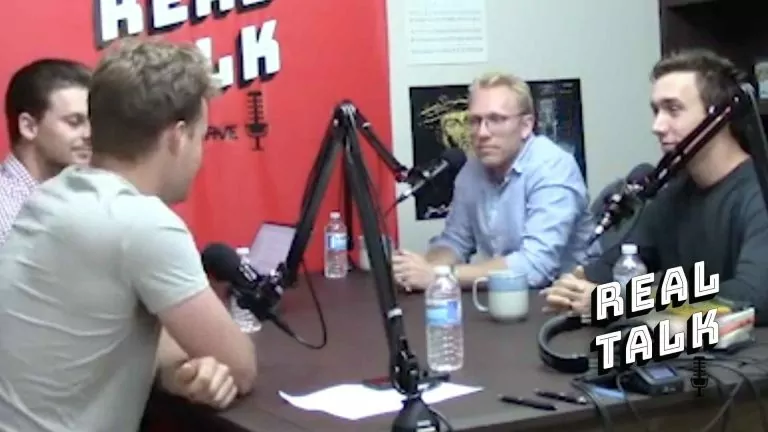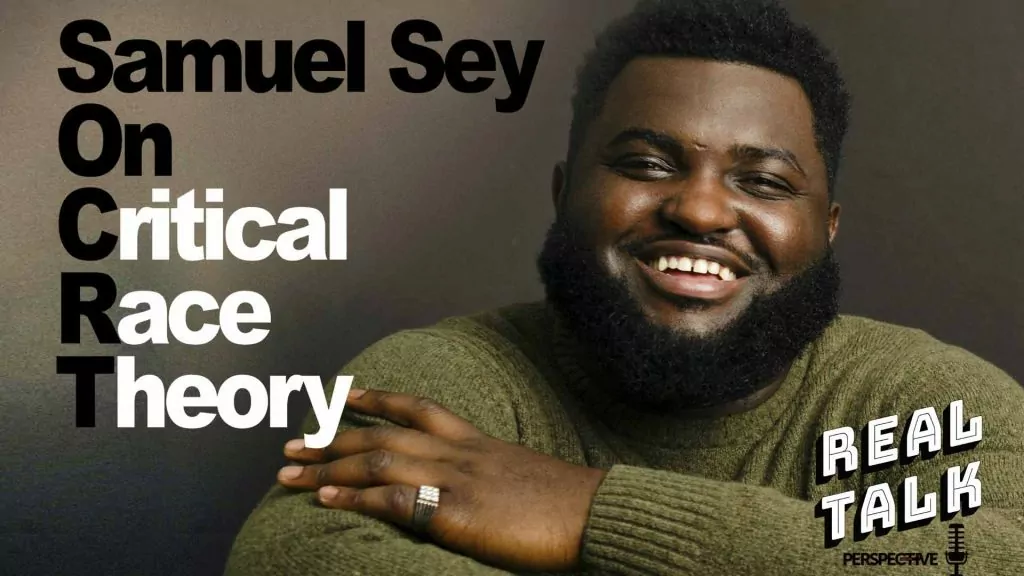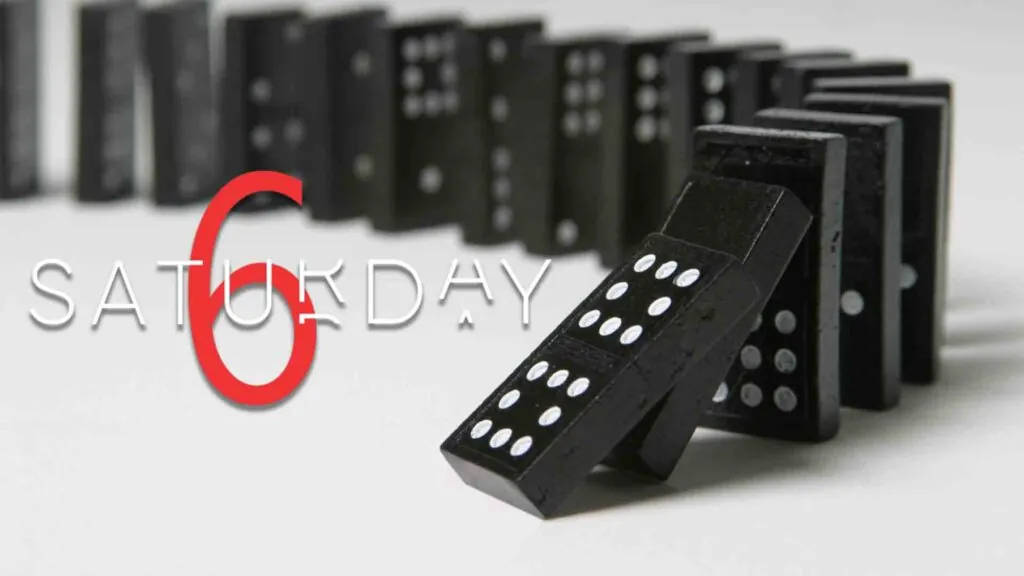“Into the Light” will equip God’s people to fight the pull of pornography
This is an overview of an episode of Lucas Holvlüwer and Tyler Vanderwoudes’ Real Talk podcast. Real Talk is a podcast of Reformed Perspective featuring great conversations on everything from propaganda to mental health, and if you haven’t checked it out already, you really should. And you really can, at www.RealTalkPodcast.ca.
*****
On this, their 50th episode, Real Talk’s Lucas and Tyler invited filmmakers Jake Valk and John-Michael Bout to talk about pornography, its devastating effects on Christians, and how the Lord’s people can fight against this terrible pervasive sin.
Bout began by describing in a very real and personal way his own decade-long struggle with pornography – the feelings of guilt at what he knew was sinful, difficulties with anger brought on by his own hypocrisy, and his gradual drift away from the Lord with a conscience made dull over time. Bout described how grateful he is that God led other Christians on his path who had turned away from porn by the Lord’s grace, and dedicated themselves to helping others with this pervasive, insidious sin.
A providential conversation
So what made the two of them think about creating a documentary? Jake Valk shared a story of having coffee with Christian author Tim Challies, whose book Sexual Detox was of great help. Not (yet) knowing that Valk was a filmmaker, Challies wondered if books were the best means to address the problem of pornography: wouldn’t video be a better medium to reach those caught up in that cycle?
This suggestion fanned a spark into a flame: why not make a documentary that would inspire people to take the steps to get out of the grip of pornography? And that is just what Valk and Bout did. Their new film, to be called Into the Light introduces six speakers with expertise in Christian responses to porn, not just in understanding that porn is sinful and wrong, but with real and practical suggestions for how to stop sinful habits, from the perspective of both those struggling with the sin, and those trying to help “the struggler.”
Valk explained:
“(One of our speakers) is Deepak Reju; he wrote the book Rescue Plan. He and Jonathan Holmes wrote a pair of books that are really good. One of the things he talks about is the philosophy of locking down a phone: how to cut off all access, and he walks you through that process from the vantage point of someone who is struggling with porn, but also if you’re helping someone who is struggling, and understand how they would be tempted to get out of the full lockdown of a phone, and so you can be extra alert to make sure that you really are shutting down a device for all it’s worth. So you can kind of take everything that our speakers talk about in the film from two different angles – the struggler, and the (one helping the struggler).”
Valk and Bout want the film to be made available for no cost to churches, organizations, and individuals, to be a resource to as many people as possible. To make this work, they’ve been fundraising through a Christian crowdfunding site with a target of $85,000. You can find out how to donate at their page GiveSendGo.com/IntoTheLight, and you can watch the trailer below.
It’s not about stopping the bad, but embracing the One Who is Good
Bout emphasized that freeing people from porn is not the end goal: the real goal is to help people find Jesus Christ, and to have Him be the foundation of their new life.
“There are other methods to get free from pornography that don’t involve God – there are many secular programs… but if you get free of porn and still lose your soul, what’s the point?”
Valk stated emphatically that a documentary can never take the place of a program like Life Renewal, with accountability, personal connections, and a thorough teaching program.
“Life Renewal is way better than what we can make. 100 percent! Life Renewal is so thorough; they really walk through the process and do it over a year. That’s way better than this!”
But there’s also a place for a film like Into the Light to help get conversations started, and to push a struggling sinner to seek help through a program like Life Renewal and other Christian resources.
“If you find this film, and you’re uncovering sin, and you’re bringing it into the light, and you’re really building your relationship with God, and you want to go to something like Life Renewal which will take you way, way deeper, please do! They do a phenomenal job.”
First, stop the bleeding
So what else is in the film? Bout summarized a section that deals with “triage”
“Deepak Reju gets into the radical practical measures of cutting off access (to porn)… if you walked into a hospital with an open wound, you’re not going to be getting asked ‘oh, so what are your symptoms, what are some things you need?’ The first thing they do is they take you in and stitch up the gaping bleeding wound so that they can have the healing take place, and to use that analogy, when you’re dealing with pornography it’s not legalism to say we have to start by cutting off access… cutting off total access.”
Valk remembered asking one of the speakers, Heath Lambert, when it was OK to introduce the internet or social media back into someone’s life.
“Heath gave a really thoughtful response to that, a large part of it being that you’re not necessarily the best person to make that choice, so having good community in your life saying, hey brother, you know it’s been two months since you last fell into pornography, you’re displaying good devotional habits, you’re really walking with the Lord, I can see that in your life. If you enjoy Instagram, I think it’s reasonable you can have it back, let’s see how that goes… So other people in your life can give you an opportunity to have a better perspective.”
Bout followed up on his own story:
“There are a lot of things that I cut out, and there’s (just) a couple of things I’ve reintroduced back. I never had to go as radical as going to a flip phone – actually, that may have been a good thing to do; I really respect people who do that. So for myself, I’ve actually kept most of the (guards) that I put in place, and just because I know I would so much rather live with the inconvenience than deal with the temptation or the potential relapse.”
What about relapse?
Speaker Ellen Mary Dykas is highlighted in one of the chapters in the film called “Endurance,” dealing with the reality of sinners struggling with a relapse, or a step backwards. Bout stated that it is very rare that one is able to “change instantly, although that is not beyond the Lord’s power. Your inadequacies, your failures do not mean that God is not able or willing to change you.” Valk summarized some of what Dykas taught:
“Your identity is not your track record. You are not your success last week, your success yesterday, the pattern of sin… even if you do really well, that’s still not your identity. Your identity has to be as a Christian, as a loved, cherished child of God, because that’s where you find your root in fighting in the first place.”
The last section of the film is presented by Garrett Kell, and reminds viewers of the hope that we have in Jesus’ saving work. Valk summarized: No matter what our sinful tendencies are today,
“one day all of this sin, that darkness, like what you did last night, all that’s going to be gone if you’re a Christian… God’s going to do away with this sin nature that we have, and that’s going to be incredible, and then there’s going to be (forever) of being porn free… I won’t have to shed another tear, an angry, frustrated tear (at my sins)… There is hope beyond this (life) where there are no tears anymore!”
You can download this and other episodes of “Real Talk” at www.RealTalkPodcast.ca, on your favorite podcast app, or through the ReformedPerspective.ca home page. You can also watch the YouTube version of the 50th episode below. For more information on “Into the Light,” go to IntoTheLightDocumentary.com.












